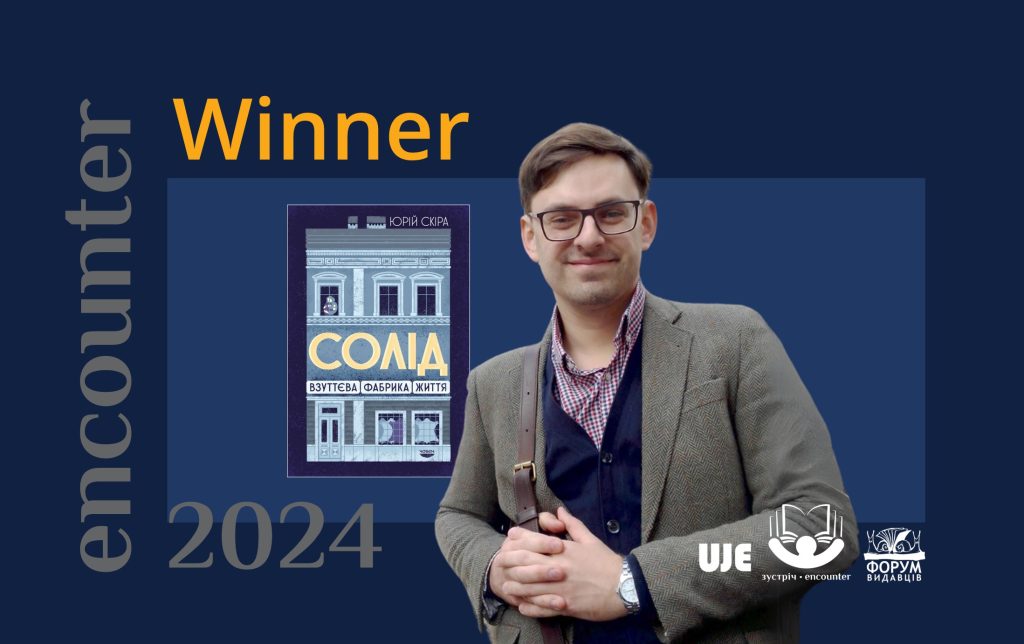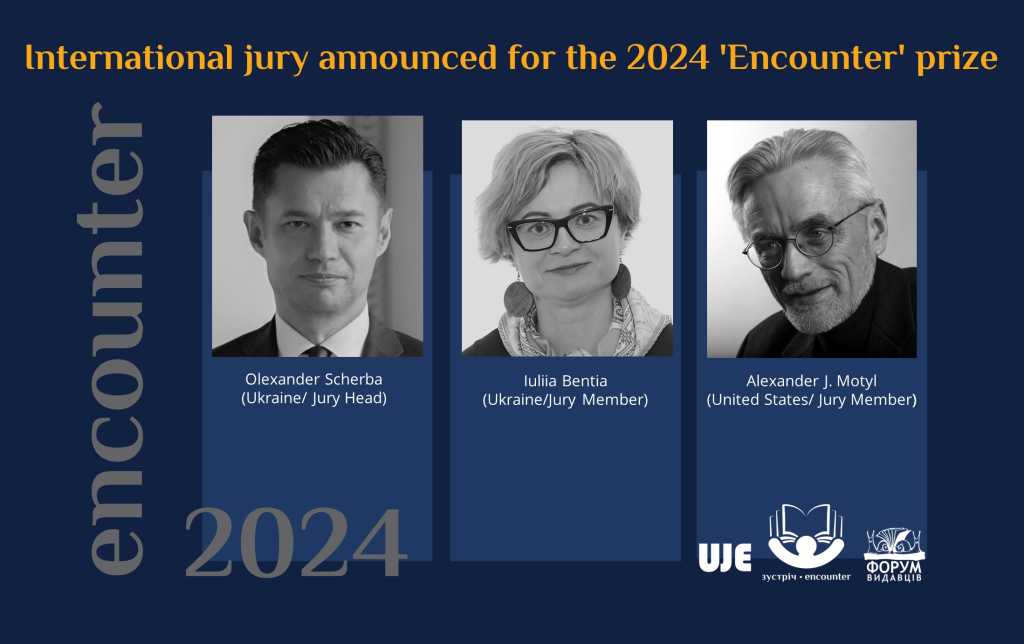"Solid. The Life-Saving Footwear Factory" by Yuriy Skira is the winner of the 2024 Encounter Literary Prize
Ukrainian Jewish Encounter (UJE), a Canadian charitable non-profit organization, and Ukraine's NGO Publishers' Forum (Lviv, Ukraine) are pleased to announce that Solid. The Life-Saving Footwear Factory, written by Yuriy Skira and published in 2023 by "Choven," a publishing house based in Lviv, Ukraine, is the fourth winner of Encounter: The Ukrainian-Jewish Literary Prize.
The award ceremony for the Encounter Prize will be live-streamed on 4 October at 1:30 pm EST (6:30 pm UK time) from the 2024 Lviv BookForum. Registration to watch the event will shortly be available on the NGO "Publisher's Forum" website.
Solid tells the little-known story of Lviv's Solid footwear factory, where Studite Brethren, with the blessing of Metropolitan Andrey Sheptytsky, hid Jews during the Holocaust. It is the story of Father Josef Peters, "Lviv's Schindler," a monk and priest who set up a successful venture to become the epicenter of a rescue operation organized by the head of the Ukrainian Greek Catholic Church. During 1942-1944, the cellars of the factory turned into a hideout for Jewish men, women and children condemned to death by the Nazi regime. There, along with monks, through searches, disease and malnutrition, they survived until the end of the occupation.
Skira is a Ukrainian historian and religious scholar who holds a Ph.D. in historical sciences. He is a Senior Researcher at the Institute of Ecumenical Studies at the Ukrainian Catholic University in Lviv. He is director of the non-profit Center for the Study of the History of Eastern Catholic Churches. His academic interests focus on issues related to the rescue of Jews during the Holocaust with the help of Ukrainian Greek Catholic clergy and monks. His book, Beckoned: Studite Monks and the Holocaust (Dukh i Litera, 2019), was short-listed for the 2021 Encounter Prize in the nonfiction category.
"The Encounter Prize is going from strength to strength," said Natalia A. Feduschak, UJE's Director of Communications. "Ukrainian writers and publishers face many challenges because of Russia's criminal war against Ukraine. Yet, they continue to explore a wide array of subjects outside the current war. This includes investigations into the country's past and Ukrainians' relationship with the many peoples that live on its territory, including Jews. Some have said Ukraine has been granted a 'pause' to study its past, particularly the Holocaust on Ukrainian lands, because of the war. However, Ukrainian scholars and writers continue that exploration, with the war providing a greater context in which to understand the past."
Members of the international jury commented on the winning entry and books submitted for the 2024 Encounter Prize:
Olexander Scherba (Ukraine/Jury Head)
Yuriy Skira's book Solid. The Life-Saving Footwear Factory talks about one of the little-known stories of the Holocaust — the rescue by Joseph Peters and other [Ukrainian] Greek Catholic monks of Lviv Jews who found employment at the local shoe factory. The time frame and background of the events are the same as in the story of "Schindler's List" in Krakow. The gloom of the occupation. Boundless, inhuman cruelty which has become a daily reality. Only everything happens not in Krakow, but in Lviv. And the key role is played not by the businessman Schindler, but by a group of priests, with the blessing of the head of the church, Andrei Sheptytsky.
The book does something that Ukraine has just begun to do — to tell the story of the Holocaust in Ukraine and to do it honestly, without ideological prejudices and political silences. Lviv, under German occupation, is depicted as a maelstrom of hatred between Ukrainians, Poles and Jews. Hatred, which is actively fueled and used by the Nazi administration for its purposes. The most important thing is "the Final Solution of the Jewish Question."
Against this background, in this impenetrable gloom, the principal active figures of this real story exist, survive, and try not to lose their human face — clergymen of the [Ukrainian] Greek Catholic Church, servants of Christ, who risk their own lives to save the Jews of Lviv from a seemingly inevitable death. They are the light that burns in the darkest of darkness.
Yuriy Skira does not ignore the darkest and most painful topics for Ukraine — such as the role of Ukrainian collaborators and the population in the Holocaust. He touches on the roots of hatred that raged in Lviv at that time. He writes dryly, factually, without excessive pathos, about the feat of the clergy, which does not detract from this feat but makes it more comprehensible and understandable. Honesty makes the book especially valuable and important for both ethnic Ukrainians and ethnic Jews. But it is especially important for Ukrainians. Jews know what happened to them during the Holocaust. In Ukraine, this topic needs to be remembered, studied more deeply, and popularized among the population, especially young people.
Yuriy Skira's brief study does not pretend to be comprehensive. It is only the first important step for Ukraine to realize the history in which there were both heroes and criminals, both darkness and light. Ukraine should know its Schindler. And she should know the extent of the suffering that Ukrainian Jews took upon themselves in those terrible years.
Iuliia Bentia (Ukraine/Jury Member)
The long list of this year's Encounter Prize showed a wide range of possible approaches to understanding Ukrainian-Jewish relations. I believe that each member of the jury was faced with a difficult choice between a brilliant bestseller that explores the psychology of a criminal (Philippe Sands); a personal history intertwined with the history of independent Ukraine, and testimonies about the experience of the (Ukrainian Insurgent Army) UPA (Evhenia Senik); filigree historical local history (Roman Mykhalchuk); fascinating travel essays (Halyna Petrosaniak); an artistic publication aimed at a teenage audience (Yulia Stakhivska); Rabbi Nachman's aphorisms translated into Ukrainian and lovingly arranged (Edvard Doks); literary regional studies or regional literary studies (Petro Rykhlo); excellent cultural journalism, written from the position and with the knowledge of a historian (Andriy Pavlyshyn). Personally, I very much wanted such an impressive genre palette to be preserved in the Encounter Prize short list because you should learn to talk about such complex and important things from different angles, reaching different audiences. I believe that our jury succeeded in this.
The victory of Yuriy Skira's book confirms the enormous demand for high-quality historical research. In this sense, this is a truly exemplary publication: a good and convincing presentation, a huge academic apparatus with the publication of archival documents, and most importantly, an awareness of the agency of both Ukrainians and Jews, showing their active interaction and mutual assistance under the most terrible circumstances of the Second World War. Without entering a direct polemic with Russian propaganda, this book destroys its foundation, its very basis. The Russian–Ukrainian war immediately changed the focus of the Encounter Prize, shifting it from building interethnic understanding within Ukraine to a global, international context. Current books from the long and short list, and especially the winning book, immediately become the voices of modern Ukraine, which must once again defend its independence. These are very different voices that reflect the long cultural and ethnic polyphony of Ukrainian life. I want to believe that, despite everything, it will be possible to preserve and nurture it in the future.
Alexander J. Motyl (United States/Jury Member)
Yuriy Skira's in-depth study of the Solid shoe factory in Lviv is an outstanding example of a historical study that successfully combines a detailed micro-study of a very particular enterprise with answers to important "macro-questions." Skira shows that life under the German occupation was difficult, that choices were complex, that inter-ethnic relations were not predetermined. Ethnicity, politics, and religion formed the backdrop to the daily interactions of living human beings. Skira's text abounds with an appreciation of subtlety and nuance, thereby managing to recreate history, as von Ranke argued, "as it truly was."
Although Skira's book stands out, the entire long list consisted of excellent books that deserved to win both recognition and prizes. Especially striking and encouraging is the unforced and easy manner with which all the books dealt with inter-ethnic — and especially Jewish-Ukrainian — relations in Ukraine. These topics, even those that are painful, are clearly becoming routinized and normalized, which is exactly as it should be. The Encounter Prize, and the Ukrainian Jewish Encounter, are to be commended for making an important contribution to this process.
Our stories are incomplete without each other
Founded in 2019, Encounter: The Ukrainian-Jewish Literary Prize is awarded annually to the most influential work in literature and nonfiction (in alternate years) that fosters Ukrainian-Jewish understanding, helping solidify Ukraine's place as a multiethnic society and giving truth to the motto, "Our stories are incomplete without each other."
The prize is valued at 7000 Euros. The winner receives 6000 Euros, with the author/s receiving 4000 Euros and the publisher 2000 Euros. Four (4) incentive awards will receive 250 Euros each.
The first Encounter Prize was awarded in September 2020 in the fiction category to Vasyl Makhno for his novel Eternal Calendar (Lviv: The Old Lion Publishing House, 2019). The second year of the award in 2021 was dedicated to the nonfiction category, with the winner being Yohanan Petrovsky-Shtern for the Ukrainian-language translation of his groundbreaking work, The Anti-Imperial Choice: The Making of the Ukrainian Jew (Kyiv: Krytyka, 2018). The third year of the award was held in 2023 in the fiction category, and Sofia Andrukhovych was named the winner for her novel Amadoka (Lviv: The Old Lion Publishing House, 2020).
The 2022 Encounter Prize was not awarded in connection with Russia's genocidal war against Ukraine.
Despite the many challenges faced by Ukraine's literary community, 11 Ukrainian publishers submitted 16 books in the 2024 competition. The long list featured nine books, five of which ended up on the short list.
Along with Solid. The Life-Saving Footwear Factory, the following books were short-listed:
Roman Myhalchuk, Death and Survival During the Holocaust: The Terrain of Modern Rivne Region (Rivne: Vydavnytsvo Volynski Oberehy, 2022)
Roman Myhalchuk, Smert i vyzhyvanniya pid chas Holokostu: terena suchasnoyi Rivenshchyny (Rivne: Vydavnytsvo Volynski Oberehy, 2022)
Petro Rykhlo, The Plucked Strings of a Loud Lyre...": German-Jewish Poets of Bukovyna (Kyiv: Dukh i Litera, 2023)
Petro Ryhlo, Urvani struny prehuchnoyi liry…Nimetski-yevreiski poety Bukovyny (Kyiv: Dukh i Litera, 2023)
Evhenia Senik, Because It Hurts (Brustury: Discursus, 2023)
Evhenia Senik, Bo bolyt (Brustury: Discursus, 2023)
Yulia Stakhivska, Sonya and the Game of Colors (Kyiv: Dukh i Litera, 2022)
Yulia Stakhivska, Sonya i hra kolioriv (Kyiv: Dukh i Litera, 2022)
The international jury for the 2024 Encounter Prize is comprised of:
Olexander Scherba (Ukraine/Jury Head)
Olexander Scherba is a Ukrainian diplomat and author who worked as Ambassador of Ukraine to Austria in 2014–2021. He currently serves as ambassador-at-large (in charge of strategic communications) at Ukraine's Ministry of Foreign Affairs and maintains one of Ukraine's leading English-language X (formerly Twitter) accounts @olex_scherba.
Iuliia Bentia (Ukraine/Jury Member)
Iuliia Bentia holds a PhD in Art Studies; is a Senior Research Fellow at the Modern Art Research Institute, the National Academy of Arts of Ukraine; and Executive Editor at Krytyka journal.
Alexander J. Motyl (United States/Jury Member)
Alexander J. Motyl (Ph.D., Columbia University, 1984) is a professor of political science at Rutgers University-Newark, writer, and painter. He served as associate director of the Harriman Institute at Columbia University in 1992–1998 and of the Division of Global Affairs at Rutgers University-Newark in 1999–2008.
Read more about the jury members here.





















